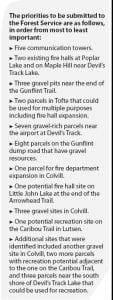What is more important: retaining the ability to keep communication towers in place, gaining the ability to expand fire halls, or obtaining properties that have gravel pits for building county roads and areas suitable for septic disposal? This is a question county commissioners and staff attempted to answer as they prioritized a list of properties the U.S. Forest Service is willing to exchange for county-owned land in the Boundary Waters Canoe Area Wilderness.
On November 15, 2011, county commissioners Fritz Sobanja, Bruce Martinson, and Jan Hall sat down with County Assessor/Land Commissioner Mary Black and several other county employees to prioritize 33 properties, almost all 40 acres in size, from most to least important for the county to receive in exchange for its BWCAW land. The list included 21 properties with gravel resources (some also suitable for septic disposal), two existing fire hall sites and four parcels that could be used for fire hall expansions, five current communication tower sites, and one parcel that could be used for recreation.
The exchange will trade sets of properties considered equal in value rather than equal in acreage. Appraisal of the properties will be done by a mutually agreed upon appraiser, and the county will be able to move items around in priority once property values have been determined. The value of the lands to be exchanged is estimated at $2.5 to $4 million.
Some sites rose quickly to the top of the list, and communication tower sites received top billing. All five tower sites currently have functioning communication towers and will be used for the state’s Allied Radio Matrix for Emergency Response that will allow governmental and rescue agencies to communicate with one another. In addition, cell phone communication “is a priority for us,” said County Engineer David Betts. “Cell communication is important.”
The Cook County Highway Department struggles to find enough gravel to meet its road-building and -maintenance needs. County Engineer David Betts said three gravel sites near the end of the Gunflint Trail would be valuable for road improvements coming down the pike. “There [are] 25 miles of road up there that need to be rebuilt or [they’re] going to fall apart,” he said.
Seven parcels near the airport at Devil’s Track hold a large amount of gravel that will be needed as roads are maintained and rebuilt. Assessor Black was not sure how the gravel-rich parcels would be assessed. “That’s kind of our wild card,” she said.
Commissioner Hall said that she and Planning & Zoning Director Tim Nelson agreed that while G&G Septic has a well-functioning septic processing facility in Cedar Grove Business Park in Grand Marais, the county still needs to have septic disposal sites in case something were to happen to that business.
Fire halls are very important community resources and found places near the top of the list. The existing fire halls at Poplar Lake and on Maple Hill near Devil’s Track Lake are on U.S. Forest Service land. The Colvill Fire Department would like to see a Forest Service parcel on County Road 14 available for expansion of the department. Another Forest Service property that could be used for fire hall infrastructure is in Hovland, although growth of that fire department is “far down the road,” Hall said. More and more people are living in Hovland fulltime, she said, but they don’t need to expand their fire hall yet. The group decided the potential fire hall site at the end of the Arrowhead Trail on the shore of Little John Lake was a valuable piece of land. Two adjoining parcels also deemed important were in Tofte; they could be used for multiple purposes, including a fire hall, a cell phone tower, an assisted living facility, and recreation.
Gravel should be a priority, Commissioner Sobanja said. Gravel is not a renewable resource, he said, and they need to think of how much gravel the county will need over the next 100 years. Where fire halls should be located years down the road is unknown, however. “Where people are going to live in the future is anyone’s guess,” he said. Commissioner Martinson pointed out that parcels that have been mined for gravel could eventually be sold for other purposes.
Commissioner Sobanja pointed out that if the county does not procure some of the land on its priority list, it could find alternative properties on state or private land.
Assessor Black was not sure how far down the list the county’s BWCAW land would “buy,” but she thought the value of the properties the county listed would be worth more than the value of its BWCAW property.
The property exchanges are expected to take place around the end of June 2013.



Leave a Reply